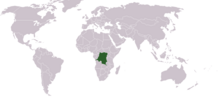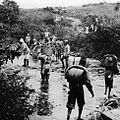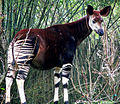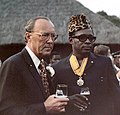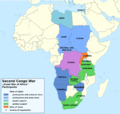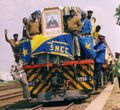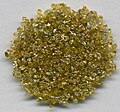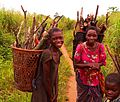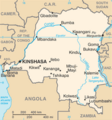Portal:Democratic Republic of the Congo
The Democratic Republic of the Congo Portal
The Democratic Republic of the Congo (also abbreviated as DR Congo,DRC, the DROC, and RDC (in French)) is a country in Central Africa. By land area, the DRC is the second-largest country in Africa and the 11th-largest in the world. With a population of around 105 million, the Democratic Republic of the Congo is the most populous Francophone country in the world, and the fourth-largest in Africa. The national capital and largest city is Kinshasa, which is also the economic center. The country is bordered by the Republic of the Congo, Central African Republic, South Sudan, Uganda, Rwanda, Burundi, Tanzania (across Lake Tanganyika), Zambia, Angola, the Cabinda exclave of Angola, and the South Atlantic Ocean. Centered on the Congo Basin, the territory of the DRC was first inhabited by Central African foragers around 90,000 years ago and was reached by the Bantu expansion about 3,000 years ago. In the west, the Kingdom of Kongo ruled around the mouth of the Congo River from the 14th to 19th centuries. In the northeast, center, and east, the kingdoms of Azande, Luba, and Lunda ruled from the 16th and 17th centuries to the 19th century. King Leopold II of Belgium formally acquired rights to the Congo territory from the colonial nations of Europe in 1885 and declared the land his private property, naming it the Congo Free State. From 1885 to 1908, his colonial military forced the local population to produce rubber and committed widespread atrocities. In 1908, Leopold ceded the territory, which thus became a Belgian colony. Congo achieved independence from Belgium on 30 June 1960 and was immediately confronted by a series of secessionist movements, the assassination of Prime Minister Patrice Lumumba, and the seizure of power by Mobutu Sese Seko in a 1965 coup d'état. Mobutu renamed the country Zaire in 1971 and imposed a harsh personalist dictatorship until his overthrow in 1997 by the First Congo War. The country then had its name changed back and was confronted by the Second Congo War from 1998 to 2003, which resulted in the deaths of 5.4 million people. The war ended under President Joseph Kabila, who governed the country from 2001 to 2019, under whom human rights in the country remained poor and included frequent abuses such as forced disappearances, torture, arbitrary imprisonment and restrictions on civil liberties. Following the 2018 general election, in the country's first peaceful transition of power since independence, Kabila was succeeded as president by Félix Tshisekedi, who has served as president since. Since 2015, the Eastern DR Congo has been the site of an ongoing military conflict in Kivu. The Democratic Republic of the Congo is extremely rich in natural resources but has suffered from political instability, a lack of infrastructure, corruption, and centuries of both commercial and colonial extraction and exploitation, followed by more than 60 years of independence, with little widespread development. Besides the capital Kinshasa, the two next largest cities, Lubumbashi and Mbuji-Mayi, are both mining communities. The DRC's largest export is raw minerals, with China accepting over 50% of its exports in 2019. In 2021, DR Congo's level of human development was ranked 179th out of 191 countries by the Human Development Index and is classed as a least developed country by the UN. , following two decades of various civil wars and continued internal conflicts, around 600,000 Congolese refugees were still living in neighbouring countries. Two million children risk starvation, and the fighting has displaced 4.5 million people. The country is a member of the United Nations, Non-Aligned Movement, African Union, COMESA, Southern African Development Community, Organisation Internationale de la Francophonie, and Economic Community of Central African States. (Full article...) Selected article -The Kivu conflict is an umbrella term for a series of protracted armed conflicts in the North Kivu and South Kivu provinces in the eastern Democratic Republic of the Congo which have occurred since the end of the Second Congo War. Including neighboring Ituri province, there are more than 120 different armed groups active in the eastern Democratic Republic of Congo. Currently, some of the most active rebel groups include the Allied Democratic Forces, the Cooperative for the Development of the Congo, the March 23 Movement, and many local Mai Mai militias. In addition to rebel groups and the governmental FARDC troops, a number of national and international organizations have intervened militarily in the conflict, including the United Nations force known as MONUSCO, and an East African Community regional force. Conflict began in 2004 in the eastern Congo as an armed conflict between the military of the Democratic Republic of the Congo (FARDC) and the Hutu Power group Democratic Forces for the Liberation of Rwanda (FDLR) in the Democratic Republic of the Congo. It has broadly consisted of three phases, the third of which is an ongoing conflict. Prior to March 2009, the main combatant group against the FARDC was the National Congress for the Defence of the People (CNDP). Following the cessation of hostilities between these two forces, rebel Tutsi forces, formerly under the command of Laurent Nkunda, became the dominant opposition to the government forces. (Full article...)General images -The following are images from various Democratic Republic of the Congo-related articles on Wikipedia.
This is a Good article, an article that meets a core set of high editorial standards.
 The involvement of the Belgian Congo (the modern-day Democratic Republic of the Congo) in World War II began with the German invasion of Belgium in May 1940. Despite Belgium's surrender, the Congo remained in the conflict on the Allied side, administered by the Belgian government in exile. Economically, the Congo provided much-needed raw materials such as copper and rubber to the United Kingdom and the United States. Uranium from the colony was used to produce the first atomic bombs. At the same time, a large supply of the territory's industrial diamonds were smuggled to Nazi Germany with the complicity of Belgian business executives. The Congo also financially supported the Belgian government in exile. Militarily, Congolese troops of the Force Publique fought alongside British forces in the East African Campaign, and a Congolese medical unit served in Madagascar and in the Burma Campaign. Congolese formations also acted as garrisons in Egypt, Nigeria and Palestine. (Full article...)
This is a Featured article, which represents some of the best content on English Wikipedia..
Jean Bolikango, later Bolikango Akpolokaka Gbukulu Nzete Nzube (4 February 1909 – 17 February 1982), was a Congolese educator, writer, and politician. He served twice as Deputy Prime Minister of the Republic of the Congo (now the Democratic Republic of the Congo), in September 1960 and from February to August 1962. Enjoying substantial popularity among the Bangala people, he headed the Parti de l'Unité Nationale and worked as a key opposition member in Parliament in the early 1960s. Bolikango began his career in the Belgian Congo as a teacher in Catholic schools, and became a prominent member of Congolese society as the leader of a cultural association. He wrote an award-winning novel and worked as a journalist before turning to politics in the late 1950s. Though he held a top communications post in the colonial administration, he became a leader in the push for independence, making him one of the "fathers of independence" in the Congo. The Republic of the Congo became independent in 1960 and Bolikango attempted to organise a national political base that would support his bid for a prestigious office in the new government. He succeeded in establishing the Parti de l'Unité Nationale and promoted both a united Congo and strong ties with Belgium. Older than most of his contemporaries and commanding significant respect—especially among his Bangala peers, he was seen as the Congo's "elder statesman". Regardless, his attempts to secure a position in the government failed and he became a leading member of the opposition in Parliament. (Full article...)
WikiProjectsTopicsCategoriesRelated portalsAssociated WikimediaThe following Wikimedia Foundation sister projects provide more on this subject:
Discover Wikipedia using portals | ||||||||



